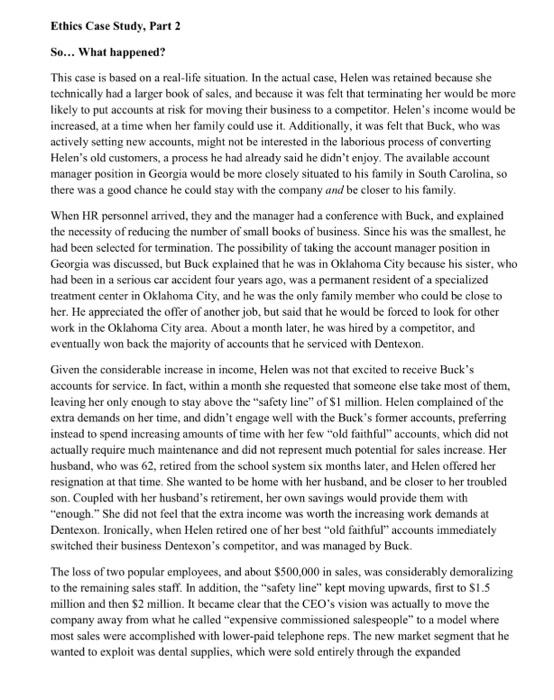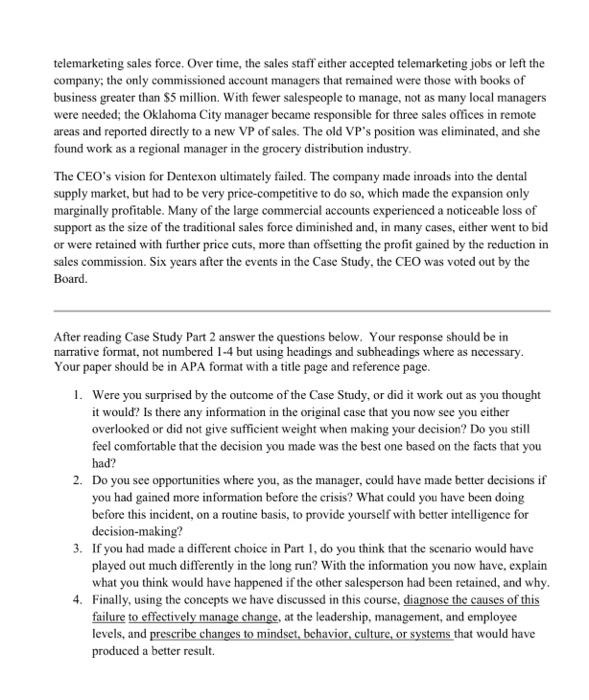Answered step by step
Verified Expert Solution
Question
1 Approved Answer
Ethics Case Study, Part 2 So... What happened? This case is based on a real-life situation. In the actual case, Helen was retained because


Ethics Case Study, Part 2 So... What happened? This case is based on a real-life situation. In the actual case, Helen was retained because she technically had a larger book of sales, and because it was felt that terminating her would be more likely to put accounts at risk for moving their business to a competitor. Helen's income would be increased, at a time when her family could use it. Additionally, it was felt that Buck, who was actively setting new accounts, might not be interested in the laborious process of converting Helen's old customers, a process he had already said he didn't enjoy. The available account manager position in Georgia would be more closely situated to his family in South Carolina, so there was a good chance he could stay with the company and be closer to his family. When HR personnel arrived, they and the manager had a conference with Buck, and explained the necessity of reducing the number of small books of business. Since his was the smallest, he had been selected for termination. The possibility of taking the account manager position in Georgia was discussed, but Buck explained that he was in Oklahoma City because his sister, who had been in a serious car accident four years ago, was a permanent resident of a specialized treatment center in Oklahoma City, and he was the only family member who could be close to her. He appreciated the offer of another job, but said that he would be forced to look for other work in the Oklahoma City area. About a month later, he was hired by a competitor, and eventually won back the majority of accounts that he serviced with Dentexon. Given the considerable increase in income, Helen was not that excited to receive Buck's accounts for service. In fact, within a month she requested that someone else take most of them. leaving her only enough to stay above the "safety line" of $1 million. Helen complained of the extra demands on her time, and didn't engage well with the Buck's former accounts, preferring instead to spend increasing amounts of time with her few "old faithful" accounts, which did not actually require much maintenance and did not represent much potential for sales increase. Her husband, who was 62, retired from the school system six months later, and Helen offered her resignation at that time. She wanted to be home with her husband, and be closer to her troubled son. Coupled with her husband's retirement, her own savings would provide them with "enough." She did not feel that the extra income was worth the increasing work demands at Dentexon. Ironically, when Helen retired one of her best "old faithful" accounts immediately switched their business Dentexon's competitor, and was managed by Buck. The loss of two popular employees, and about $500,000 in sales, was considerably demoralizing to the remaining sales staff. In addition, the "safety line" kept moving upwards, first to $1.5 million and then $2 million. It became clear that the CEO's vision was actually to move the company away from what he called "expensive commissioned salespeople" to a model where most sales were accomplished with lower-paid telephone reps. The new market segment that he wanted to exploit was dental supplies, which were sold entirely through the expanded telemarketing sales force. Over time, the sales staff either accepted telemarketing jobs or left the company; the only commissioned account managers that remained were those with books of business greater than $5 million. With fewer salespeople to manage, not as many local managers were needed; the Oklahoma City manager became responsible for three sales offices in remote areas and reported directly to a new VP of sales. The old VP's position was eliminated, and she found work as a regional manager in the grocery distribution industry. The CEO's vision for Dentexon ultimately failed. The company made inroads into the dental supply market, but had to be very price-competitive to do so, which made the expansion only marginally profitable. Many of the large commercial accounts experienced a noticeable loss of support as the size of the traditional sales force diminished and, in many cases, either went to bid or were retained with further price cuts, more than offsetting the profit gained by the reduction in sales commission. Six years after the events in the Case Study, the CEO was voted out by the Board. After reading Case Study Part 2 answer the questions below. Your response should be in narrative format, not numbered 1-4 but using headings and subheadings where as necessary. Your paper should be in APA format with a title page and reference page. 1. Were you surprised by the outcome of the Case Study, or did it work out as you thought it would? Is there any information in the original case that you now see you either overlooked or did not give sufficient weight when making your decision? Do you still feel comfortable that the decision you made was the best one based on the facts that you had? 2. Do you see opportunities where you, as the manager, could have made better decisions if you had gained more information before the crisis? What could you have been doing before this incident, on a routine basis, to provide yourself with better intelligence for decision-making? 3. If you had made a different choice in Part 1, do you think that the scenario would have played out much differently in the long run? With the information you now have, explain what you think would have happened if the other salesperson had been retained, and why. 4. Finally, using the concepts we have discussed in this course, diagnose the causes of this failure to effectively manage change, at the leadership, management, and employee levels, and prescribe changes to mindset, behavior, culture, or systems that would have produced a better result.
Step by Step Solution
★★★★★
3.47 Rating (154 Votes )
There are 3 Steps involved in it
Step: 1
1 I was not surprised by the outcome of the case study The information in the original case suggeste...
Get Instant Access to Expert-Tailored Solutions
See step-by-step solutions with expert insights and AI powered tools for academic success
Step: 2

Step: 3

Ace Your Homework with AI
Get the answers you need in no time with our AI-driven, step-by-step assistance
Get Started


